Searching for answers around Guardian employees, SEIU and students
Before sunrise, only street lights lit the corner of Clifton and Fullerton avenues on Tuesday, Oct. 24. At 6:45 a.m., a huddle of umbrellas and ponchos — some emblazoned with the letters “SEIU” — formed as DePaul students and community members arrived at the intersection. The rain, though only a light shower, made 38 degrees feel like a snowflake away from freezing.
At 7 a.m., the crowd had grown to over 60 people. They gathered in solidarity with employees of Guardian Security Services who work as overnight desk receptionists at DePaul, as well as to protest what they considered unfair labor practices by Guardian. According to students and organizers, a handful of Guardian receptionists had gone on an unfair labor practice strike that morning. Beyond the scope of a simple protest, a strike can be defined as a “collective, organized, cessation or slowdown of work by employees, to force acceptance of their demands by the employer.”
Specifically, an unfair labor practice striker is defined by The National Labor Relations Board as someone who strikes for a business practice committed by their employer. Such strikers can be neither discharged nor permanently replaced in the absence of serious misconduct.
However, at this time, it is unclear how many overnight desk receptionists actually went on strike, if any did. Conflicting accounts from activists and students — coupled with deference from the university and a lack of communication between parties involved at DePaul — have all clouded the actual circumstances around the strike as well as the labor conditions they work in.
PART 1: Take My Card
By September, the Service Employees International Union (SEIU) Local 1, a division of the union founded in Chicago and located in 12 cities across the Midwest, started to organize in support of the non-unionized desk receptionists who work from midnight until 8 a.m. They also contacted student activist organizations in the fall, according to students involved.
Overnight receptionists working inside residence halls and the Music Annex in Lincoln Park are employed by Guardian and in turn contracted through DePaul. During the Oct. 24 protest and directly after, organizers reported that several Guardian employees had gone on strike earlier that morning to protest what SEIU Local 1 described as unfair labor practices, including low wages.
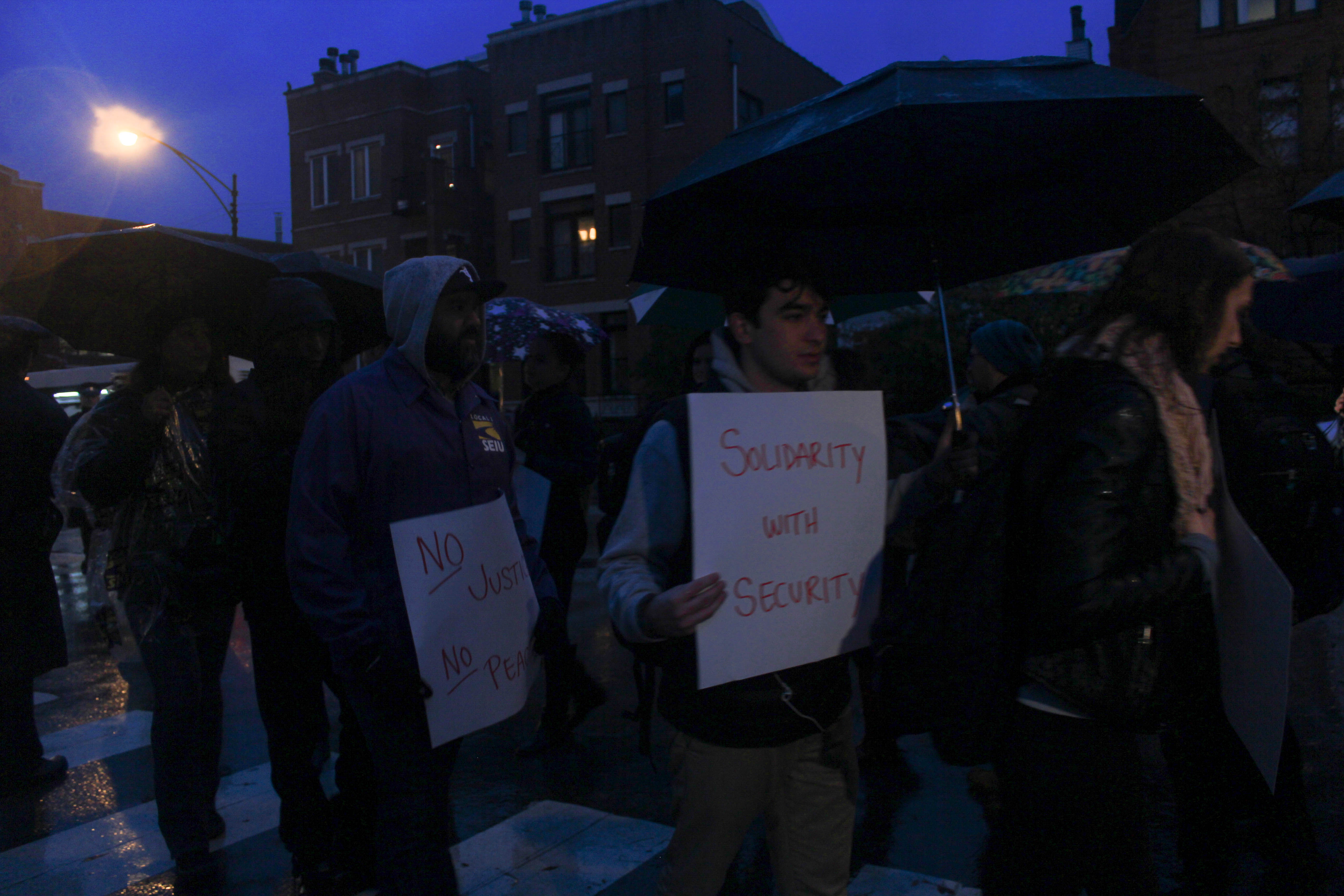
Students and SEIU employees march back and forth across Clifton Avenue. (Meredith Melland, 14 East)
“Five out of the 15 workers went on strike. There are 10 workers that work on any given day, so half of today’s shift went on strike,” wrote SEIU Communications Director Izabela Miltko-Ivkovich, in an Oct. 24 email obtained by 14 East. (It is not clear how many Guardian employees are actually assigned to work at DePaul. In the course of its investigation,14 East spoke to 19 different overnight receptionists.) The idea behind the protests was to push DePaul into replacing “Guardian Security with a responsible union contractor,” according to a press release from SEIU Local 1.
While photos of some Guardian employees appeared in SEIU flyers advertising the strike, there is ambiguity around who contacted whom. Two Guardian desk receptionists at DePaul said SEIU Local 1 members approached them multiple times since the summer. One employee said they were approached near the Fullerton ‘L’ station after leaving their overnight shift. They declined speaking with the SEIU representative, but exchanged phone and email information. The representative followed up with the employee via phone call, but it went to voicemail because the employee wasn’t able to answer. However, they remember the representative’s name was Kevin.
Another receptionist also said they were approached by two SEIU employees. Tucked away in their wallet, this receptionist still had the business card they left with the name “Kevin Pietrick” on it. The same employee also said Kevin and another man had approached them near their car multiple times. Kevin Pietrick is an organizer for SEIU Local 1 and could not be reached for comment via Facebook Messenger and email at the time of publication.
Alexandria Boutros, co-president of IMPACT at DePaul and one of the student leaders associated with the protest, said Pietrick was being mischaracterized. “He’s not that aggressive,” she said. “He’s an organizer, and he’s passionate about this work.”
At the Oct. 24 protest, Pietrick said that Guardian employees had sought out SEIU’s help, not the other way around. “Guardian security officers reached out to SEIU Local 1 expressing an urge to make some changes with it because their company just wasn’t going to do it on their own,” Pietrick said.
SEIU’s work with Guardian employees this year is not the first time the union has tried to organize on DePaul’s campus. In 2016, representatives from SEIU worked with adjunct faculty members — part-time instructors at DePaul with limited benefits and bargaining rights — to unionize. The effort appeared to fizzle in the spring after DePaul announced “enhanced benefits and support” for adjuncts including a change to the school’s course cancellation policy and the creation of a task force to address adjunct concerns. Around the same time, the university warned faculty and staff in a March 31 email about “unwelcomed union contact” both on- and off-campus “in ways that have made [the adjunct staff] uncomfortable,” according to an article in The DePaulia.
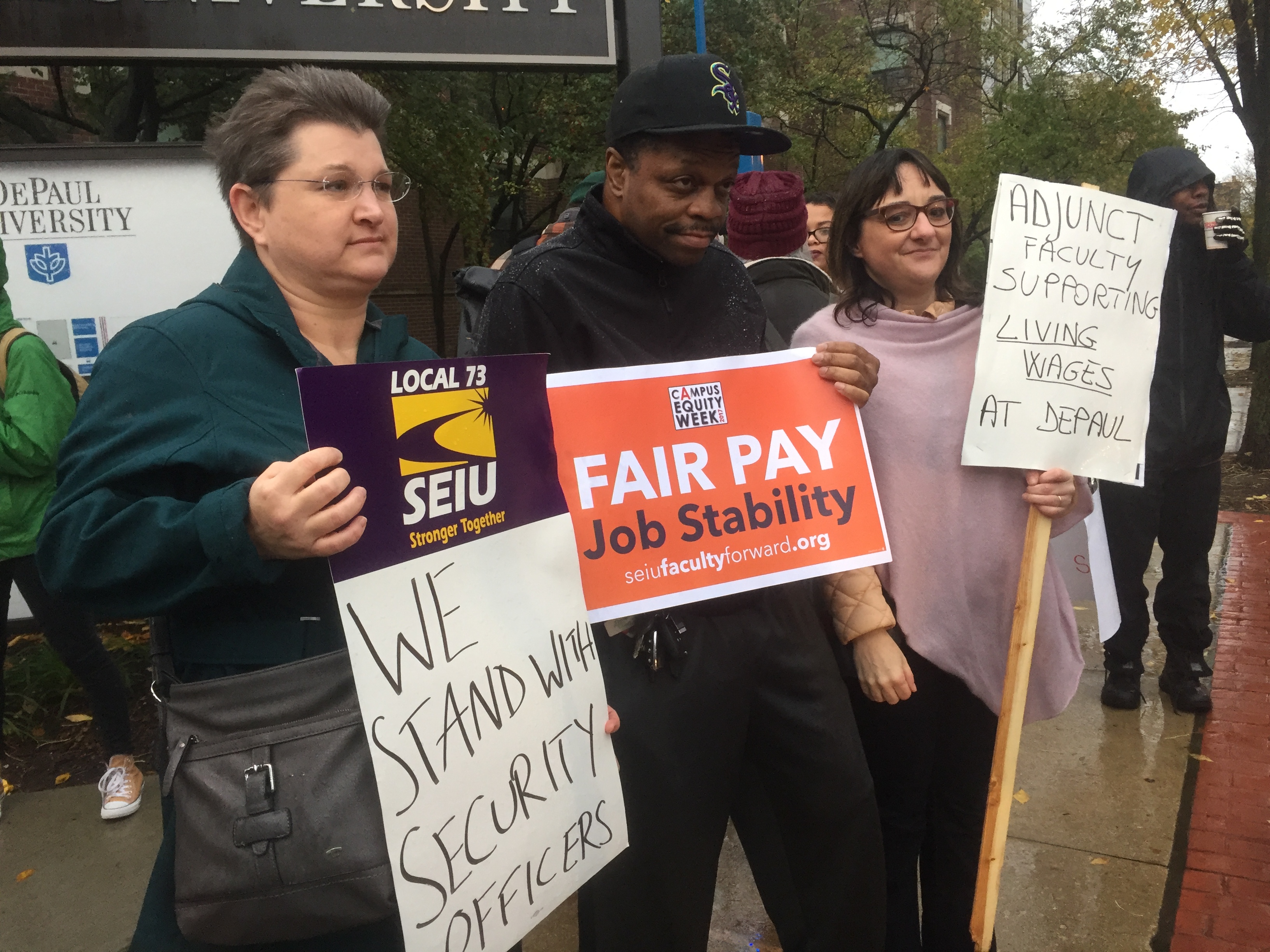
Modern language adjunct professors at DePaul attend the Oct. 24 protest to support the overnight desk receptionists. (Marissa Nelson, 14 East)
PART 2: Students Act
Regardless of origin, SEIU Local 1 and some of the Guardian employees met and discussed organizing. Shortly thereafter, SEIU Local 1 reached out to student activists at DePaul to help organize and create awareness on campus. Among organizations that agreed to help were IMPACT, (I Matter, Political Activism Can Too), DePaul’s branch of the International Socialist Organization (ISO) and the Roosevelt Institute. The student organizations began to meet with James Povijua, community organizing coordinator at SEIU Local 1.
At the end of September, the student activists collected student signatures for a petition to show the overnight desk receptionists had support if they chose to strike for better labor conditions. According to an SEIU press release, over a thousand signatures were collected.
In mid-October, a letter of intent to strike was delivered to DePaul’s Department of Housing Services. A week and a half later, on the day of the strike, SEIU Local 1 and student activists organized a protest during the final hour of the night shift at 7 a.m. In the days leading up to the event, the student organizers worked to generate awareness on campus about the issue through flyers, written commitments to protest and phone calls to those who signed the petition.
Immediately after the protest, the student organizers were hesitant to attach a headcount to the strike. Claire Jones Anderson, co-president of IMPACT, couldn’t estimate how many employees didn’t show up to work. Anderson suggested speaking with Boutros, her co-president at IMPACT. Boutros could also not confirm the number of strikers, but said the strike happened.
“I was there, and saw them deliver the letter of intent, saw them send the email to the housing person saying there was a delivered letter of intent,” Boutros said. “A one-day strike — there were guards who did not show up to work and stiked.”
“I think five went on strike,” T.J. Watson said, a member of DePaul’s branch of ISO.
The student activists initially planned to have “walk-backs” the following night for the Guardian workers who had gone on strike, but IMPACT informed 14 East that afternoon that the walk-backs had been cancelled. The walk-backs would have consisted of students escorting Guardian desk attendants to residence halls before their shifts started to show solidarity with the workers and their resolve to strike.

The DePaul Socialists engage in a discussion after the protest for Guardian workers Tuesday, Oct. 24. (Marissa Nelson, 14 East)
On the day of the strike, DNAinfo Chicago quoted Kevin Pietrick, writing: “Pietrick said they were unsure how many of the estimated 15 Guardian Security officers were engaging in the one-day strike Tuesday.”
Student daytime desk receptionist Gabrielle Berry could not confirm the strike happened. According to Berry, DePaul prepared for the possible strike by asking student desk receptionists via email to sign up for a shift outside of their normal hours. The added shift, called “Guardian support,” ran from midnight to 2 a.m. on Tuesday, Oct. 24. After the strike, Berry asked a head desk receptionist how many students worked the extra shift.
“She said that no [desk receptionists] had to stay late — they didn’t have to do the 12 to 2 a.m. shift because all the Guardian people showed up,” Berry said.
However, it is possible that a strike could have occurred without requiring DePaul students to fill the “Guardian support” shift. Given the nature of their employment, Guardian may have supplied receptionists who do not normally work at DePaul to fill gaps left by strikers. Guardian did not directly address questions related to strike replacements.
When asked how many of the Guardian desk attendants did not show up for their scheduled shifts for the morning of Tuesday, Oct. 24, Rick Moreci, DePaul’s Director of Housing Services, wrote that “all of them reported for, and worked the entirety of their scheduled shifts.”
PART 3: Accounts from Behind the Desk
Following the protest on Oct. 24, 14 East approached 19 overnight desk receptionists at DePaul employed by Guardian for comment, some of whom work part-time on weekends. They were cautious when asked about the labor dispute between some of the receptionists, Guardian Security Services and DePaul University. Seven of the receptionists declined to answer any questions, but 12 receptionists spoke about their experiences — all on the condition of anonymity.
When it was “no” from the desk receptionists, it was a hard “no.” Short with their words, one of the employees said they “could not participate at all” in the investigation. But when it was “yes,” a long conversation followed.
None of the desk receptionists could confidently answer questions about the strike. One employee guessed around five employees went on strike; another did not believe anyone went on strike. Five employees said they didn’t know. One employee who believed desk receptionists had gone on strike speculated that Guardian sent other employees to fill the empty positions.
On the other hand, all of the employees 14 East spoke to could confidently say they would like to see changes at Guardian, including higher wages, more frequent raises at higher intervals and more affordable healthcare. However, they varied on the best way to achieve those results. Some supported unionizing, others didn’t. Three employees who supported unionization were skeptical that SEIU was the best union to organize with.
“Unions are like car salesmen and insurance salesmen,” said one receptionist. This receptionist supported unionizing if it meant better working conditions but acknowledged the union dues might offset the raise acquired from unionizing with SEIU.
Another receptionist against unionizing feared an overall wage increase for Guardian employees at DePaul would become too expensive for the school, leading the university to switch to a less expensive contractor and leaving all current employees without a job. They were also concerned SEIU would profit “too much” off of the employees.
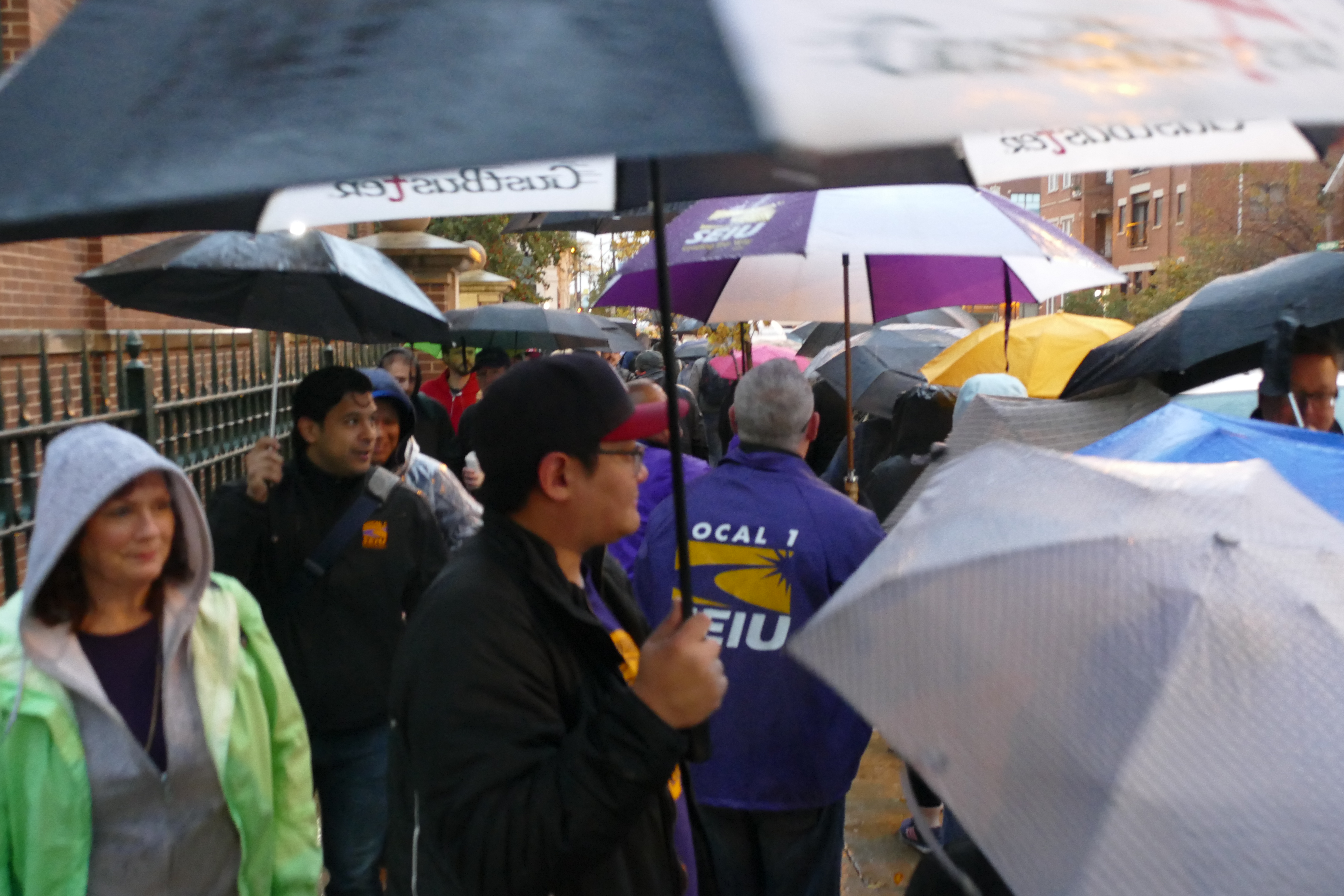
Students, organizers and community members protest unfair labor practices. (Marissa Nelson, 14 East)
Employees who have worked at DePaul for at least two years each reported beginning at wages ranging from $11 to $12 an hour. Since being hired, each employee has received one to three raises.
“I’ve worked for this company for two, almost three years and I’ve had one wage increase,” said Timothy Winfrey, an overnight desk receptionist, at the protest on Oct. 24.
Columbia College Chicago also contracts Guardian Security Services. Several employees at Columbia were hesitant to speak. When asked to answer questions about their experience with Guardian, an employee said, “It depends on the question; I’m not trying to get fired.” After guaranteeing anonymity, the Columbia employees who spoke with 14 East reported starting at a wage between $11 and $12 an hour.
“Guardian and I have a rocky relationship,” said one of the employees at Columbia. Both employees reported being approached by two SEIU representatives, including a man named Kevin.
Loyola University does not contract with an outside company. Instead, the overnight desk receptionists, or night monitors, as they are referred to at Loyola, work for the university directly. 14 East spoke with two night monitors at Loyola about their experience. Both were satisfied with their job, co-workers, wages and health care. Both employees willing to speak had been working at Loyola for a minimum of two years making at least $12 an hour. Both employees had received a raise each year they had been working at the university.
PART 4: What Must Be Done?
Many of the students involved in organizing efforts argued that DePaul has a responsibility to monitor work practices of the contractors they employ. Three of the student activists mentioned DePaul’s Vincentian question — what must be done? — when speaking about why the university should take action. With a mission tied to service and social justice, they believe the well-being of all employees, including employees through contract, should be a top concern for the university.
“This is what must be done,” said Boutros. “It is making sure that the people that are being paid through our tuition dollars aren’t being exploited, because the U.S. has a history of exploitation and we shouldn’t be paying into that.”
DePaul University’s Office of Public Relations & Communications declined to directly respond to inquiries on whether or not a strike occurred and, if so, how many overnight desk receptionists went on strike. Instead, the university repeatedly directed all questions regarding overnight desk receptionist wages, health care and attendance on Oct. 24 to Guardian Security Services.
“Guardian Security Services has been a contractor for DePaul University for a number of years, providing overnight front desk security in our residence halls,” said DePaul spokesperson Carol Hughes. “Guardian’s business operations and employment practices are independent from DePaul.”
Hughes also declined to answer questions related to DePaul’s agreement with Guardian, saying that “as a matter of practice, we do not discuss publicly terms of our contracts.” She did, however, say that “DePaul already enjoys productive relations with unions” representing its catering service, facility operations and “numerous construction trades.”
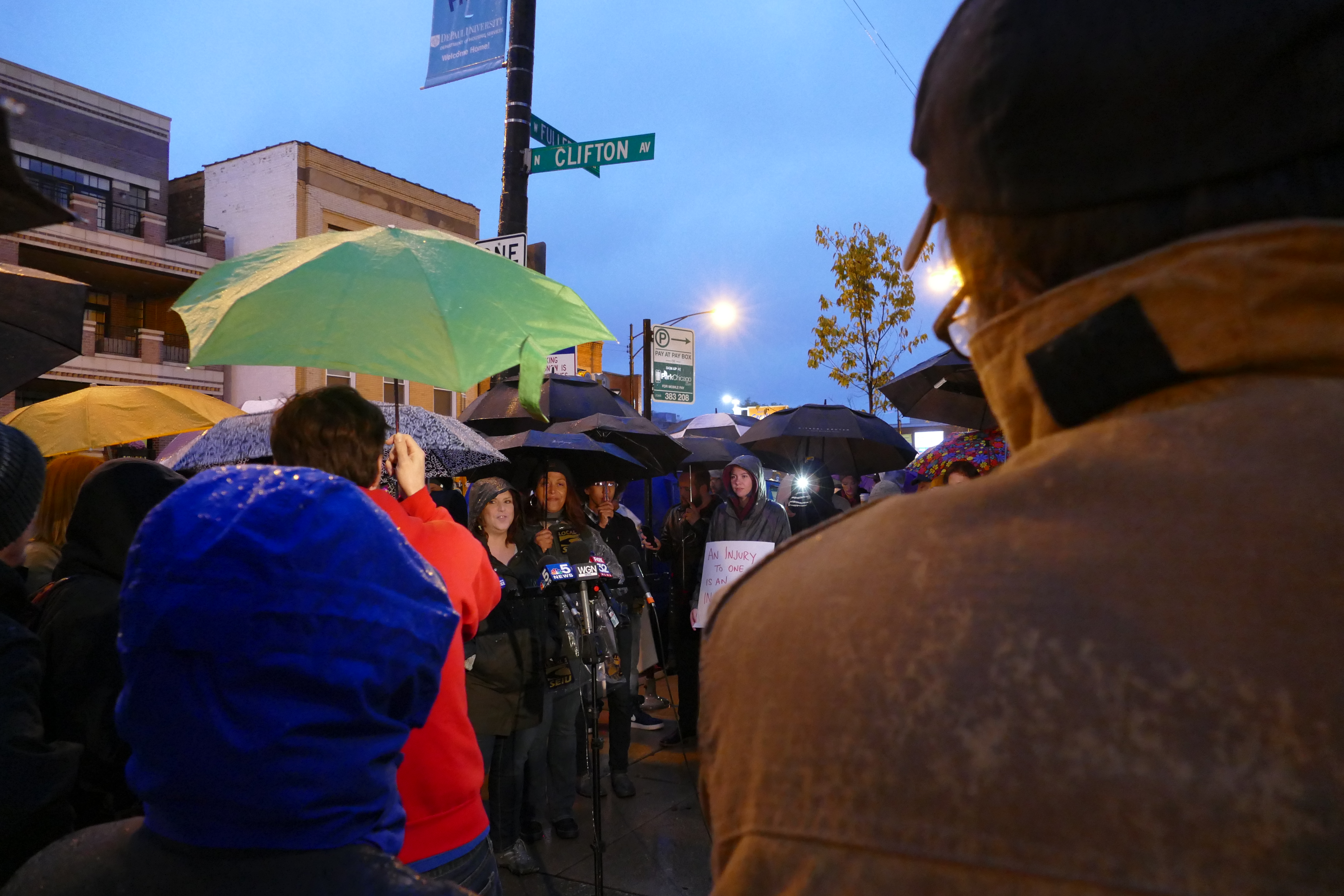
After the protest, a press conference was held on the corner of Clifton and Fullerton avenues. (Marissa Nelson, 14 East)
Guardian Security Services management was also contacted by phone and email regarding DePaul’s contracted desk receptionists. In a statement, Guardian spokesperson Chet Strzelczyk responded to student and organizer concerns about the overnight desk receptionists. Strzelczyk did not provide the number of overnight desk receptionists who did not show up to work on Oct. 24.
“Our employees receive wages significantly higher than the $11 per hour rate negotiated by SEIU for its members and our average length in employee tenure is roughly seven years which far exceeds the industry norm,” Strzelczyk wrote in an email.
Referencing unionization, Strzelczyk also wrote: “Our hard-working employees recognize that they can achieve a better future for themselves without the interference of third parties who may not have our employees’ best interests in mind.”
PART 5: Searching for Resolution
Two and a half weeks after the protest, student activists are still trying to remedy the labor dispute between Guardian desk attendants, DePaul and Guardian Security Services. DePaul’s Student Government Association (SGA) and IMPACT members drafted a set of resolutions by Oct. 23, and SGA approved them at its general body meeting on Oct. 26, according to SGA Parliamentarian and Roosevelt Institute e-board member Jack Evans.
“This is a formal stance that student government is taking to say that this is an issue that we want to fix,” Evans said.
Evans is working with SGA and IMPACT to develop a case against Guardian to present to the DePaul Fair Business Practices Committee at their first meeting in winter quarter.
“We want to make sure that the administration’s aware that this company is an unethical company and isn’t treating their workers properly,” Evans said. “So we’re not doing this to make demands on behalf of the workers; our goal is to make sure that we’re bringing DePaul to the table.”
The resolutions, sponsored by Jack Evans and Josh Kaufman, said that SGA “encourages the university to push Guardian Security Services Inc. to provide a livable wage and fair benefits to the employees.”
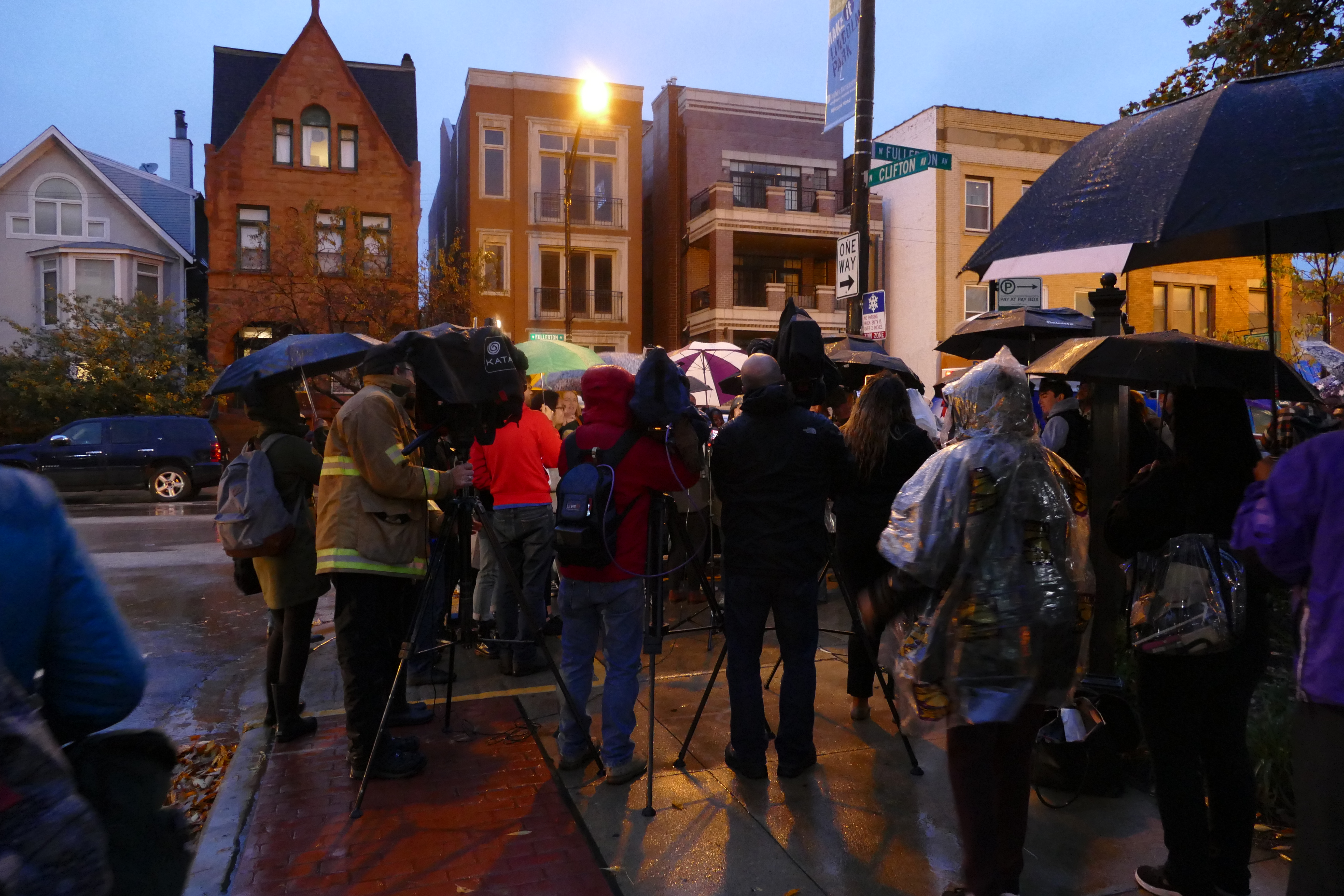
Local media, students, organizers and community members wait for the protest to begin. (Marissa Nelson, 14 East)
The resolutions also advocate for the Fair Business Practices Committee “to adopt a more transparent and equitable standard for evaluation of companies the University contracts with.”
Many students and DePaul community members continue to advocate for DePaul’s Guardian desk receptionists.
Jones Anderson, speaking for IMPACT, said that “we are prepared to be advocates for these people, even if SEIU will not.”
Additional reporting by Cody Corrall, Emma Krupp, Madeline Happold, Brendan Pedersen, Megan Stringer, and Ivana Rihter.
Header image by Meredith Melland.
Correction: An earlier article referred to IMPACT co-president Alexandria Boutros as Alexandra Boutros. The error has since been corrected.


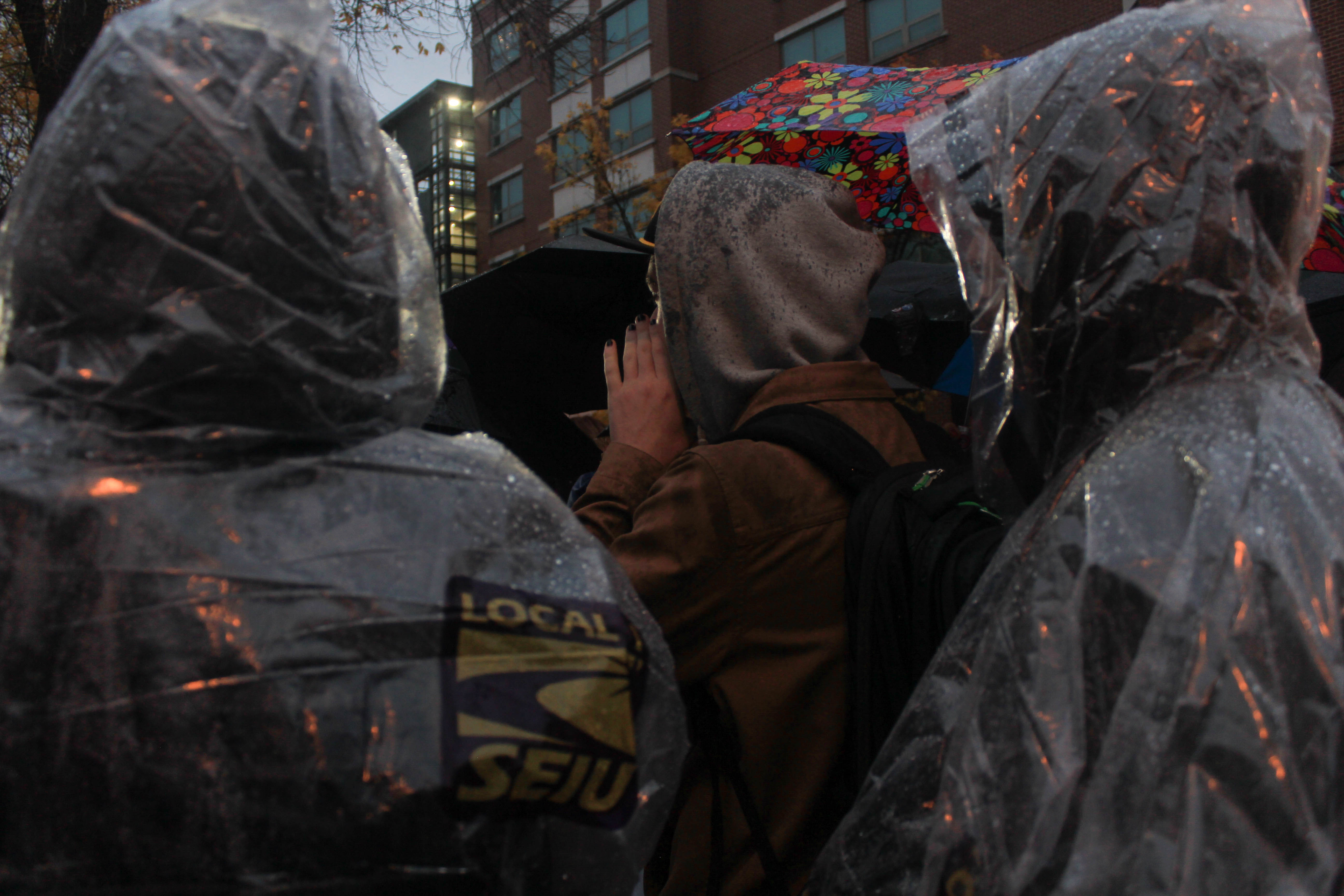

NO COMMENT